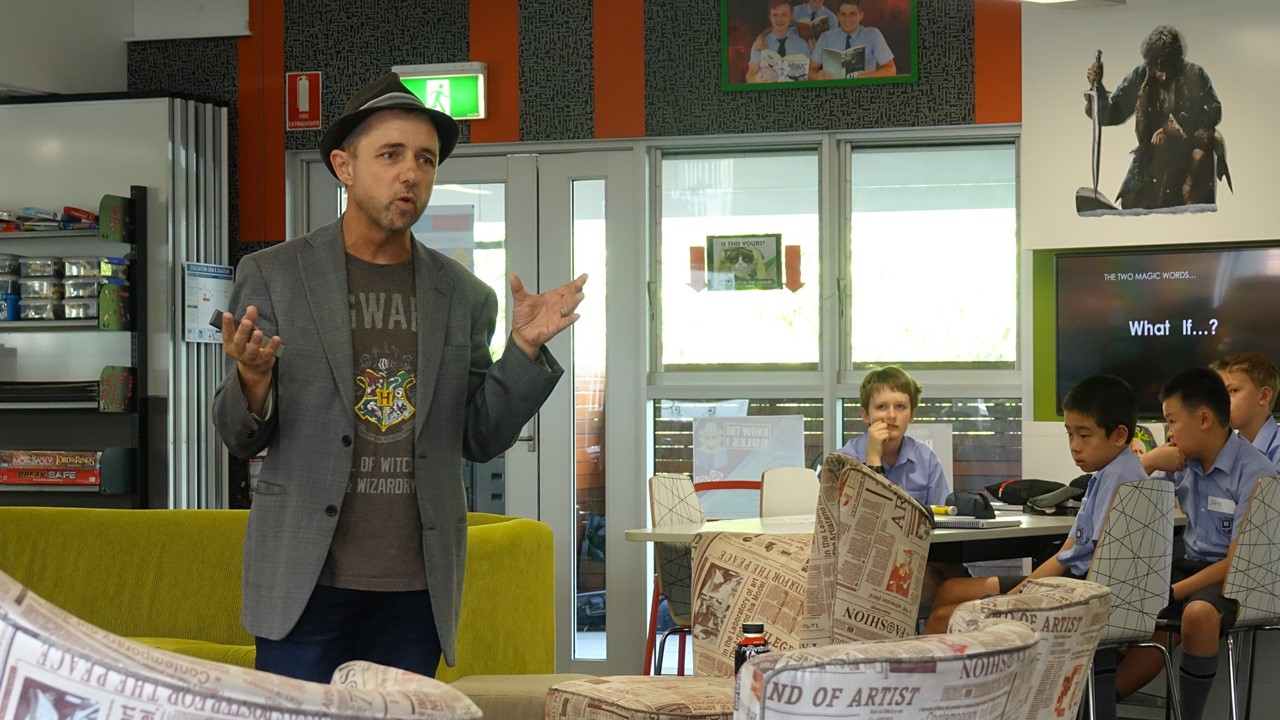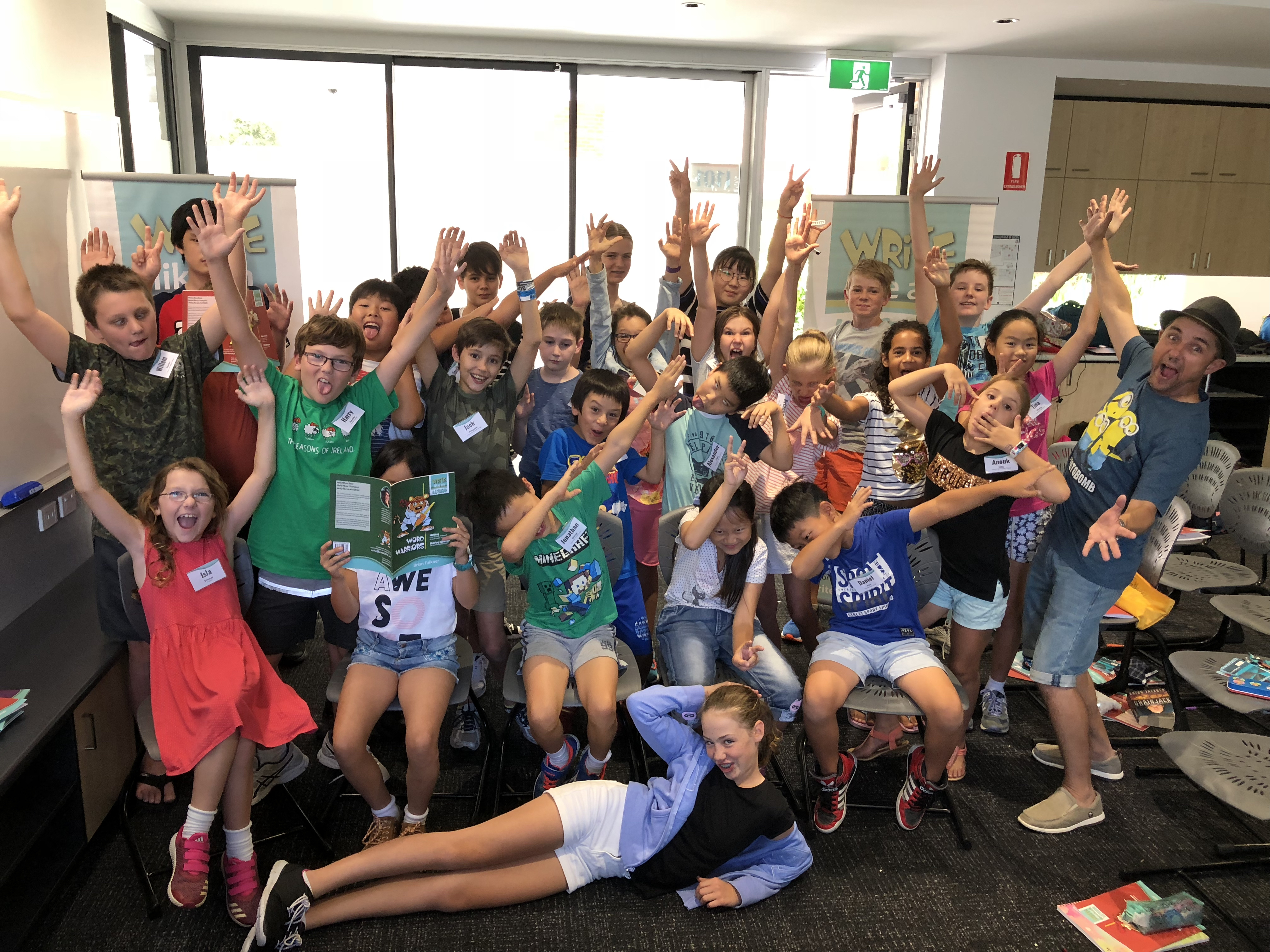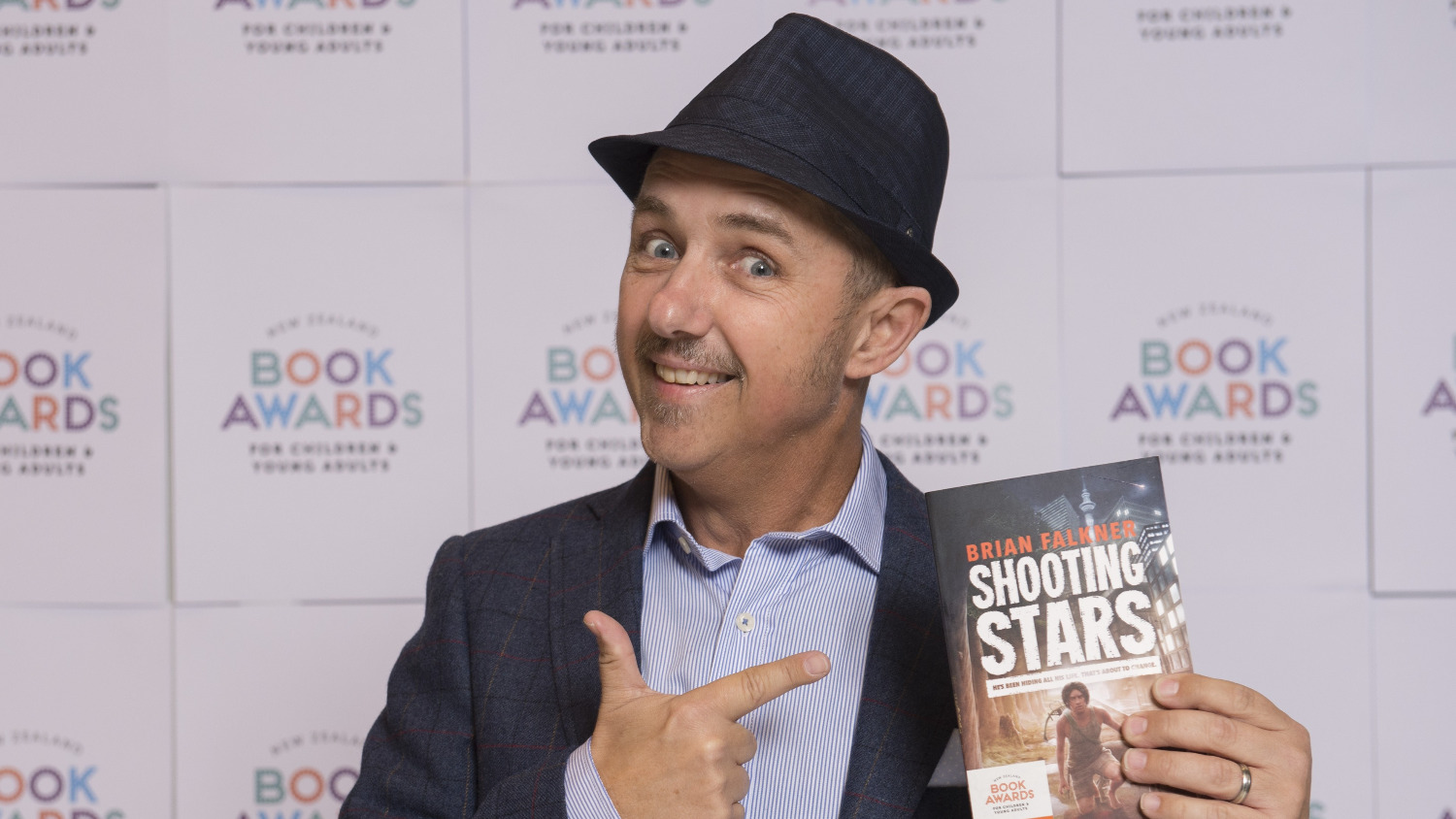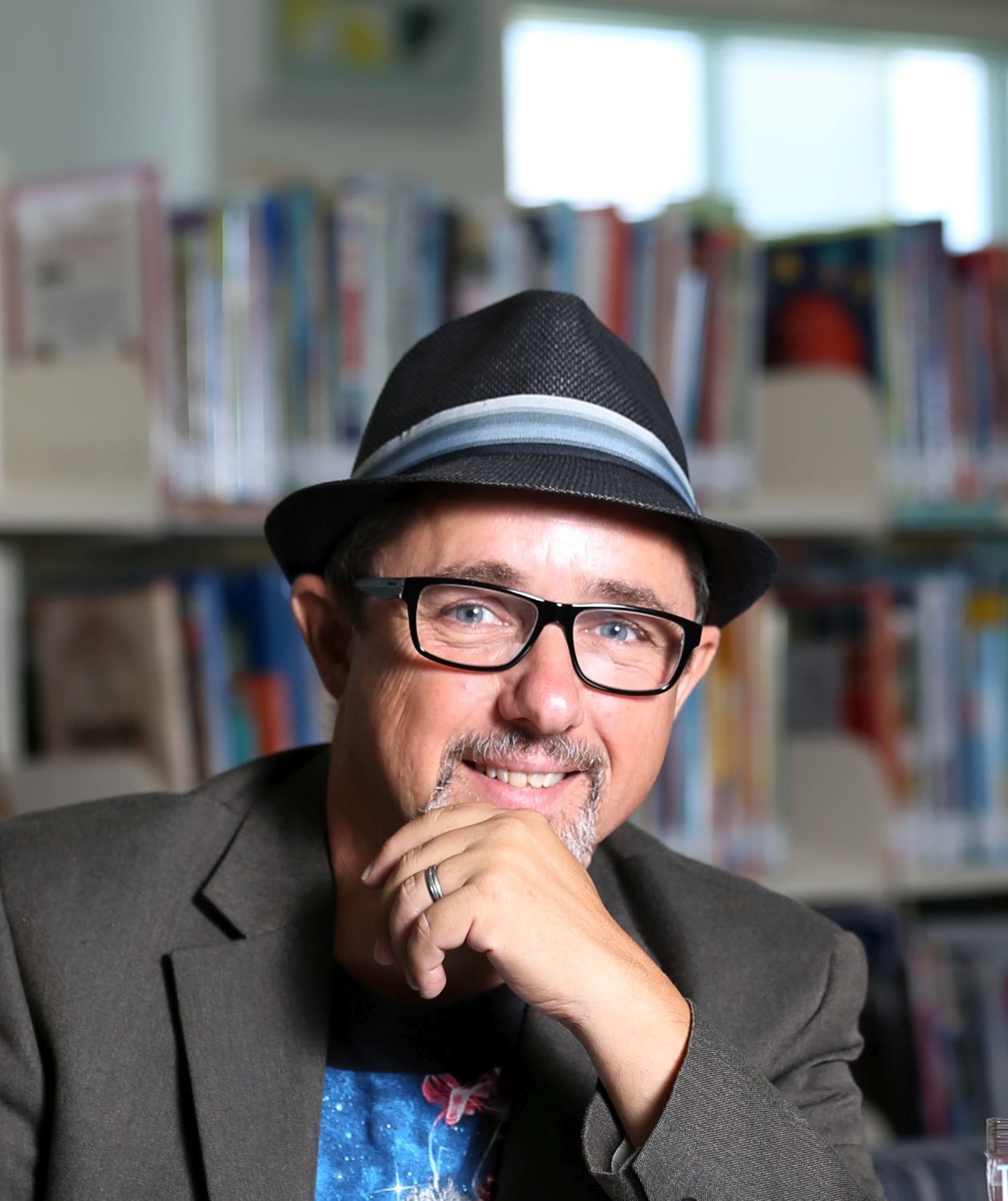In 2007, when I first encountered Brian Falkner, he was at the top of the national request list for the Writers in Schools programme, which I ran at the NZ Book Council. He wrote books about sports, about soft drink formulas, about genius kids who are smarter than adults.

Brian also had a range of workshop options – one was a story-creation workshop based on his book Super Freak; the other was the Taste Test. I came to know the Taste Test well, after spending an evening driving Brian to every service station and supermarket in Christchurch to find all of the ingredients. I became disillusioned with the way in which Pepsi and Coke had divided the nation’s retailers.
In the past year, Brian has published three books – the second in his Battlesaurus series, called Clash of Empires; short story collection That Stubborn Seed of Hope, and 1917: Machines at War. I interviewed him about performing in schools, making a living from writing, and how he writes.
— — —
When he was first published, Brian was still working as a web developer – not as common in 2003 as it is now. I talked to Brian about his first school visit back then, which was to Mellon’s Bay Primary School.
‘I worked out a few things to talk about that I thought would be entertaining for the students. Not long after that, a teacher friend of mine at a school in Orewa asked me to come and talk. I loved both experiences and the kids seemed to get a lot out of it, as well as be quite entertained by it.’
His workshops and visits have developed a lot since the early days. ‘I have gradually honed my presentation and developed other programmes such as StorySports and my Write Like an Author workshops. When something works, I keep it in; when it doesn’t, after a few tries I take it out.’
‘When something works, I keep it in; when it doesn’t,after a few tries I take it out.’
Brian’s skill at working with a group of kids is fantastic to watch. He understands class dynamics and gets them eating out the palm of his hand. He says, ‘Part of that is instinctive – but nowadays, most of it is just experience. After nearly 15 years of giving hundreds of presentations each year, you know what will work in most situations.’
In 2011, Brian created the circumstances for himself to become a full-time writer by moving to Gold Coast City, Australia and becoming part of the thriving Australian school speaking circuit. ‘By moving to Australia I was able to work almost full-time as a school speaker for six months of the year, and take the other six months to write.
‘The speaking fees for a writer in Australia are a lot higher than in New Zealand. Very few writers can support themselves just on advances and royalties; we all need something to supplement our income.’ .

Books, books, books
Brian’s first book was Henry and the Flea published by Mallinson Rendel in 2003 and by Walker Books Australia (as The Flea Thing). Next was The Real Thing in 2004, then The Super Freak in 2005 – each had in common a male protagonist with some type of super-power, set in modern-day settings with realistic backgrounds.
‘For my first published novel, Henry and the Flea, I wrote the entire first draft in around four weeks. Apart from a couple of tricky scenes in the middle, I knew the story I wanted to tell, and how I wanted to tell it.’
For my first published novel, Henry and the Flea, I wrote the entire first draft in around four weeks.
Before being published, like a lot of authors, Brian had been writing for most of his life in various genres and formats. He says, ‘Generally, I find that it flows.’ He notes that sometimes this isn’t the case, but if the concept is strong enough, he’ll keep working and trust that it will flow, eventually!
The first major international deal for Brian came with the publication of The Tomorrow Code (Random House, New York). He took his manuscript to New York, attending appointments with publishers made by his New Zealand agent Frances Plumpton. This lead to Brian finding an agent in the US, Nancy Gallt, and she arranged the sale to Random House there.
Since this success, he says, ‘I know there are editions of my books in the US, Canada, Germany, France, Japan, The Netherlands, Turkey, and Slovenia, as well as Australia and New Zealand.’
Brian says the most important thing for writers who believe their work has an international market to do is believe in themselves.
‘New Zealand writers are producing work that I believe is every bit as good or better than many books which have been huge international successes. It is always going to be a bit of a lottery and nobody seems to know, not agents, publishers or authors, where lightning is going to strike. Nevermoor, by Jessica Townsend is evidence of this.’
New Zealand writers are producing work that I believe is every bit as good or better than many books which have been huge international successes.
Deepening skill
A couple of years ago, Brian’s book Battlesaurus: Rampage at Waterloo was published for the US market. I was at that time the Administrator for the NZ Book Awards for Children and Young Adults, so he called me from Australia to see whether the NZ published edition would be eligible for the awards the following year. I concluded, after some reading of the rules, it would. Running through my head at the time was something along the lines of ‘A dino mash-up in awards? Really?!’
Oh, yes. Dinosaur historical fiction can indeed win awards – and in this particular case, in these particular hands, for good reason. After reading all of the finalists in that year for The Spinoff, it stood out as a winner to me, as well as to the judges of the NZ Book Awards for Children & Young Adults in 2016, where it won the YA prize.

Since the first Battlesaurus, we’ve seen this growing skill for telling inner lives, evident in 2016’s Shooting Stars (Scholastic NZ), and last year’s That Stubborn Seed of Hope (UQP), as well as in 1917: Machines at War, his addition to the WW1 series by Scholastic NZ.
Brian specialises in characters with complex family or personal lives, and often some type of special skill. As he states, ‘I read somewhere that all lead characters are to some extent a version of the author,’ I’m now wondering what his superpower is! Surviving cancer comes to mind. Brian had a frightening year in 2017, battling throat cancer, which saw him fail to write a book that year – however, he is now cancer-free.
On character development, he says, ‘I always know what kind of character I want in a story, and I will spend a lot of time, before writing word one, thinking about and developing the characters, but a lot of that goes out of the window by about chapter three. By that stage, if the story is flowing, the characters have taken on a life of their own.
I always know what kind of character I want in a story, and I will spend a lot of time, before writing word one, thinking about and developing the characters…
‘Of course, this means that I have to go back and rewrite their character summaries to match what I have learned by writing their stories.’
One of the things I have observed in all of Brian’s novels I’ve read is that he is absolutely top at writing gripping, page-turning action sequences. The soul of these, he says, is that the threat to the character must be real. ‘The audience must believe them to be in real and imminent danger. And of course it must be the character who wins the day.’ No deus ex machina for Brian – he says ‘it seems like a dull let-down to an action scene, so I never go there.’
Another tactic he employs in his novels is the use of a character’s friends to help them process emotions and solve problems. I asked him about his favourite relationships in his books.
‘One of my favourite relationships in my books occurs in my first book. Daniel, the main character, has a best friend called Jason. I loved the character Jason, and I loved the relationship between the two boys. It is short and simple, but still powerful, at least to me.
‘Other relationships that I think are quite special are between Frost, the blinded officer, and Jack, the artilleryman, in Battlesaurus: Rampage at Waterloo; and the minor, but important relationship between Egan and Little Allan in Shooting Stars.’

In December, The Sapling reproduced one of the short stories from That Stubborn Seed of Hope, published by UQP and Brian’s first short story collection. As I’m aware of writers’ habits of squirreling ideas that don’t quite fit, I wondered whether they were all intended as short stories. ‘All except “Sins and Griefs” were intended as short stories. [That] was intended to be the start of a novel, but one that had a complete story structure within itself. I have never written the novel, and am not sure I ever will.’
Brian’s next new publication, Cassie Clark: Outlaw is coming in September, from New Zealand’s newest children’s book publisher, OneTree House. He says it contains ‘political intrigue, danger, guns and action!’
‘It began with a conversation I had with a friend about what he considered to be the real reason behind the US invasion of Iraq. I think it is probably true that there is much more going on behind the scenes than we ever get to find out about. This book is based on a number of very intriguing conspiracy theories that one day might just be proven to be true.’
This book is based on a number of very intriguing conspiracy theories that one day might just be proven to be true.
Finally, I asked Brian what the hallmarks of a good book are. Here is how he knows he has a good one: ‘After I have put it down for a moment, I am still thinking about it, and can’t wait to pick it up again. A book that you want to read as fast as you can, to find out what happens, but you want to read as slow as you can because you don’t want it to end.’
Exactly. We will continue to watch as Brian’s career uses his stubborn seed of hope to shoot him to the stars (see what I did there?!). He’s the Real Thing.

Sarah Forster has worked in the New Zealand book industry for 15 years, in roles promoting Aotearoa’s best authors and books. She has a Diploma in Publishing from Whitireia Polytechnic, and a BA (Hons) in History and Philosophy from the University of Otago. She was born in Winton, grew up in Westport, and lives in Wellington. She was a judge of the New Zealand Book Awards for Children and Young Adults in 2017. Her day job is as a Senior Communications Advisor—Content for Te Herenga Waka—Victoria University of Wellington.



